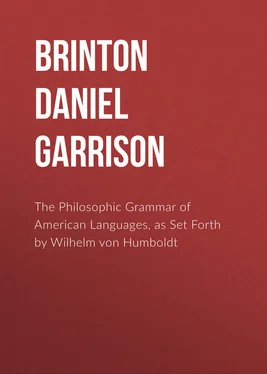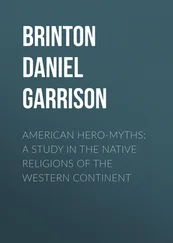Daniel Brinton - The Philosophic Grammar of American Languages, as Set Forth by Wilhelm von Humboldt
Здесь есть возможность читать онлайн «Daniel Brinton - The Philosophic Grammar of American Languages, as Set Forth by Wilhelm von Humboldt» — ознакомительный отрывок электронной книги совершенно бесплатно, а после прочтения отрывка купить полную версию. В некоторых случаях можно слушать аудио, скачать через торрент в формате fb2 и присутствует краткое содержание. ISBN: , Жанр: foreign_antique, foreign_prose, на английском языке. Описание произведения, (предисловие) а так же отзывы посетителей доступны на портале библиотеки ЛибКат.
- Название:The Philosophic Grammar of American Languages, as Set Forth by Wilhelm von Humboldt
- Автор:
- Жанр:
- Год:неизвестен
- ISBN:http://www.gutenberg.org/ebooks/36646
- Рейтинг книги:5 / 5. Голосов: 1
-
Избранное:Добавить в избранное
- Отзывы:
-
Ваша оценка:
- 100
- 1
- 2
- 3
- 4
- 5
The Philosophic Grammar of American Languages, as Set Forth by Wilhelm von Humboldt: краткое содержание, описание и аннотация
Предлагаем к чтению аннотацию, описание, краткое содержание или предисловие (зависит от того, что написал сам автор книги «The Philosophic Grammar of American Languages, as Set Forth by Wilhelm von Humboldt»). Если вы не нашли необходимую информацию о книге — напишите в комментариях, мы постараемся отыскать её.
The Philosophic Grammar of American Languages, as Set Forth by Wilhelm von Humboldt — читать онлайн ознакомительный отрывок
Ниже представлен текст книги, разбитый по страницам. Система сохранения места последней прочитанной страницы, позволяет с удобством читать онлайн бесплатно книгу «The Philosophic Grammar of American Languages, as Set Forth by Wilhelm von Humboldt», без необходимости каждый раз заново искать на чём Вы остановились. Поставьте закладку, и сможете в любой момент перейти на страницу, на которой закончили чтение.
Интервал:
Закладка:
In a later paper, he announced his special study of this group as still in preparation. It was, however, never completed. His earnest desire to reach the fundamental laws of language led him first into a long series of investigations into the systems of recorded speech, phonetic hieroglyphics and alphabetic writing, on which he read memoirs of great acuteness.
In one of these he again mentions his studies of the American tongues, and takes occasion to vindicate them from the current charge of being of a low grade in the linguistic scale. “It is certainly unjust,” he writes, “to call the American languages rude or savage, although their structure is widely different from those perfectly formed.” 9 9 Ueber die Buchstabenschrift und ihren Zusummenhang mit dem Sprachbau , Bd. vi, s. 526
In 1828, there is a published letter from him making an appointment with the Abbé Thavenet, missionary to the Canadian Algonkins, then in Paris, “to enjoy the pleasure of conversing with him on his interesting studies of the Algonkin language.” 10 10 This letter is printed in the memoir of Prof. E. Teza, Intorno agli Studi del Thavenet sulla Lingua Algonchina , in the Annali delle Università toscane , Tomo xviii (Pisa, 1880).
And a private letter tells us that in 1831 he applied himself with new zeal to mastering the intricacies of Mexican grammar. 11 11 Compare Prof. Adler’s Essay, above mentioned, p. 11.
About 1827, he found it indispensable to subject to a critical scrutiny the languages of the great island world of the Pacific and Indian oceans. This resulted at last in his selecting the Kawi language, a learned idiom of the island of Java, Malayan in origin but with marked traces of Hindu influence, as the point of departure for his generalizations. His conclusions were set forth in the introductory essay above referred to.
The avowed purpose of this essay was to demonstrate the thesis that the diversity of structure in languages is the necessary condition of the evolution of the human mind . 12 12 This is found expressed nowhere else so clearly as at the beginning of § 13, where the author writes: “Der Zweck dieser Einleitung, die Sprachen, in der Verschiedenartigkeit ihres Baues, als die nothwendige Grundlage der Fortbildung des menschlichen Geistes darzustellen, und den wechsel seitigen Einfluss des Einen auf das Andre zu erörtern, hat mich genöthigt, in die Natur der Sprache überhaupt einzugehen.” Bd. vi, s. 106.
In the establishment of this thesis he begins with a profound analysis of the nature of speech in general, and then proceeds to define the reciprocal influences which thought exerts upon it, it upon thought.
Portions of this work are extremely obscure even to those who are most familiar with his theories and style. This arises partly from the difficulty of the subject; partly because his anxiety to avoid dogmatic statements led him into vagueness of expression; and partly because in some cases he was uncertain of his ground. In spite of these blemishes, this essay remains the most suggestive work ever written on the philosophy of language.
§ 3. The Final Purpose of the Philosophy of Language
Humboldt has been accused of being a metaphysician, and a scientific idealist.
It is true that he believed in an ideal perfection of language, to wit: that form of expression which would correspond throughout to the highest and clearest thinking. But it is evident from this simple statement that he did not expect to find it in any known or possible tongue. He distinctly says, that this ideal is too hypothetical to be used otherwise than as a stimulus to investigation; but as such it is indispensable to the linguist in the pursuit of his loftiest task – the estimate of the efforts of man to realize perfection of expression. 13 13 “Der Idee der Sprachvollendung Dasein in der Wirklichkeit zu gewinnen.” Ueber die Verschiedenheit , ss. 10 and 11. The objection which may be urged that a true philosophy of language must deal in universals and not confine itself to mere differentiations (particulars) is neatly met by Dr. Schasler, Die Elemente der Philosophischen Sprachwissenschaft , etc., p. 21, note.
There is nothing teleological in his philosophy; he even declines to admit that either the historian or the linguist has a right to set up a theory of progress or evolution; the duty of both is confined to deriving the completed meaning from the facts before them. 14 14 In his remarkable essay “On the Mission of the Historian,” which Prof. Adler justly describes as “scarcely anything more than a preliminary to his linguistical researches,” Humboldt writes: “Die Philosophie schreibt den Begebenheiten ein Ziel vor: dies Suchen nach Endursachen, man mag sie auch aus dem Wesen des Menschen und der Natur selbst ableiten wollen, stört und verfalscht alle freie Ansicht des eigenthümlichen Wirkens der Kräfte.” Ueber die Aufgabe des Geschichtschreibers , Bd. i, s. 13.
He merely insists that as the object of language is the expression of thought, certain forms of language are better adapted to this than others. What these are, why they are so, and how they react on the minds of the nations speaking them, are the questions he undertakes to answer, and which constitute the subject-matter with which the philosophy of language has to do.
Humboldt taught that in its highest sense this philosophy of language is one with the philosophy of history. The science of language misses its purpose unless it seeks its chief end in explaining the intellectual growth of the race. 15 15 “Das Studium der verschiedenen Sprachen des Erdbodens verfehlt seine Bestimmung, wenn es nicht immer den Gang der geistigen Bildung im Auge behält, und darin seinen eigentlichen Zweck sucht.” Ueber den Zusammenhang der Schrift mit der Sprache , Bd. vi, s. 428.
Each separate tongue is “a thought-world in tones” established between the minds of those who speak it and the objective world without. 16 16 “Eine Gedankenwelt an Töne geheftet.” Ueber die Buchstabenschrift und ihre Zusammenhang mit dem Sprachbau , Bd. vi, s. 530.
Each mirrors in itself the spirit of the nation to which it belongs. But it has also an earlier and independent origin; it is the product of the conceptions of antecedent generations, and thus exerts a formative and directive influence on the national mind, an influence, not slight, but more potent than that which the national mind exerts upon it. 17 17 This cardinal point in Humboldt’s philosophy is very clearly set forth in his essay, “ Ueber die Aufgabe des Geschichtschreibers ,” Bd. i, s. 23, and elsewhere.
So also every word has a double character, the one derived from its origin, the other from its history. The former is single, the latter is manifold. 18 18 See Ueber die Buchstabenschrift , etc., Bd. vi, s. 530.
Were the gigantic task possible to gather from every language the full record of every word and the complete explanation of each grammatical peculiarity, we should have an infallible, the only infallible and exhaustive, picture of human progress.
§ 4. Historical, Comparative and Philosophic Grammar
The Science of Grammar has three branches, which differ more in the methods they pursue than in the ends at which they aim. These are Historic, Comparative and Philosophic Grammar. Historic Grammar occupies itself with tracing the forms of a language back in time to their earlier expression, and exhibits their development through the archaic specimens of the tongue. Comparative Grammar extends this investigation by including in the survey the similar development of a number of dialects of the same stock or character, and explains the laws of speech, which account for the similarities and diversities observed.
Читать дальшеИнтервал:
Закладка:
Похожие книги на «The Philosophic Grammar of American Languages, as Set Forth by Wilhelm von Humboldt»
Представляем Вашему вниманию похожие книги на «The Philosophic Grammar of American Languages, as Set Forth by Wilhelm von Humboldt» списком для выбора. Мы отобрали схожую по названию и смыслу литературу в надежде предоставить читателям больше вариантов отыскать новые, интересные, ещё непрочитанные произведения.
Обсуждение, отзывы о книге «The Philosophic Grammar of American Languages, as Set Forth by Wilhelm von Humboldt» и просто собственные мнения читателей. Оставьте ваши комментарии, напишите, что Вы думаете о произведении, его смысле или главных героях. Укажите что конкретно понравилось, а что нет, и почему Вы так считаете.












